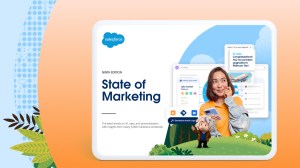Editor’s note: Visualisations included throughout this article are set to global responses to the State of Marketing report by default. UK and Ireland responses are available via filter.
Marketers in the UK and Ireland (UKI) are prioritising building and retaining trust with customers and improving their use of AI tools and technologies, according to new Salesforce research in the ninth State of Marketing report.
Why it matters: With customers’ standards for personalisation continuing to rise year after year and technologies to support that level of engagement constantly evolving, marketing teams need to act fast to keep up. Many see AI as a key tool to improve personalisation, enhance productivity, and now, scale creativity with generative AI. However, marketers are struggling with integrating, securing, and unifying the trusted customer and business data required to deliver AI-powered solutions.
With insights from over 4,800 marketers across 29 countries, including 350 in the UK and Ireland, the State of Marketing report highlights how top-performing marketers are outdoing their competition by embracing these and other new opportunities while mitigating data, trust, and security challenges.
Marketers pursue more tailored engagement amid rising customer expectations
Increasingly, marketers aim for more customised experiences based on detailed data like individual behaviors, preferences, interactions, or other specific indicators. And they are looking to AI to deliver more insights, predictions, automated workflows, and content. As a result, marketers consider having a data and AI strategy of utmost importance.
On average, today’s UK and Ireland, marketers are able to fully personalise across six channels.
Marketers rev up AI adoption, but underperformers stall out in the evaluation stage
Marketers are pulled in many directions, from aiming to deepen customer trust, extract maximum value from their existing internal tools, or any of the tasks in between. Yet challenges with attribution and creating cohesive customer journeys, among other factors, threaten progress.
AI could be one tool to help teams overcome such challenges. Salesforce Chief Marketing Officer Ariel Kelman highlights how companies are entering “a new era of AI, catalysed by the generative gold rush,” and that the technology is being embraced by marketing organisations. As he sees it, “marketers are leading the charge by embracing rapid advancements in the technology to better connect with customers and prospects.”
Marketers are eager to implement AI into their own work streams: 73% in the UK, and 75% in Ireland, are already experimenting with or have fully implemented AI in their workflows. A closer look reveals that the embrace of the technology varies by performance level.
The majority of high- and moderate-performing top-tier and mid-level marketing teams are already rigorously testing, tweaking, and incorporating AI into their operations. Still, more than one-third of underperformers in the UK and Ireland have yet to graduate from the consideration phase.
In fact, in the UK, high-performing marketing teams are 3.1x more likely than underperformers to have fully integrated AI into their operations. Meanwhile, in Ireland, marketing teams are 2.6x more likely. Until underperformers pivot from passive planning to hands-on action, AI’s advantages will continue to elude them.
Marketers embrace AI to predict, create, and integrate at scale
So what types of AI are marketers using — and how? In the UK, the three most popular AI use cases among marketers are getting performance analytics, driving best offers in real time, and automating data integration. In comparison, the three most popular use cases among Irish marketers are automating data integration, generating content, and improving customer segmentation / lookalike audience modeling.
Despite AI enthusiasm, concerns about trusted data remain
Compared to their peers in other departments, marketers are especially concerned about falling behind on generative AI adoption.
Globally, eighty-eight percent of marketers are worried about missing out on generative AI’s benefits, compared to 78% of sales and 73% of service colleagues.
Even so, senior marketers remain cautious, citing concerns such as data and job security. Compared to their peers further up the corporate ladder, on-the-ground team leads are particularly wary about job stability. One in four team leads are worried AI will replace their job. For their part, CMOs are most concerned with data leaks, with 41% citing data exposure as their top concern compared to 29% of VPs and 32% of team leads.
As marketers drive toward effective AI implementation, they’re counting on data to help. Globally, the two most popular strategies for data capture, leveraging customer service data and transaction data, show an effort to partner with colleagues across sales and commerce departments to accomplish this. However, unification of that and other data — such as unstructured data from emails, NFTs, and more — remains a challenge.
UKI marketers still unsatisfied with the ability to unify customer data sources
Only 34% of marketers in the UK and 23% in Ireland respectively, are fully satisfied with their ability to unify customer data sources. What’s more, only approximately half of global marketers say their systems automatically and regularly update with data from sales, service, commerce, and other departments.
Without fully integrated data, marketers’ ability to derive sharp insights is blunted, leaving core activities like analysing performance, suppressing audiences, and building campaigns powered by out-of-date or incomplete information. It even jeopardises marketers’ number top priority: effectively leveraging AI. As Kelman sees it, “a strong data foundation will be critical to AI success for marketers as they work to bring together and unify customer data for real-time activation.”
A closer look at the survey results shows that fully integrated data is more common among high-performing marketing teams, suggesting that investing in unification can give marketers an edge.
Go deeper:
- Read the full State of Marketing report
- Learn more about key marketing trends according to Salesforce’s CMO Ariel Kelman
- Dig deeper into how marketers are approaching generative AI
- Learn how Marketing Cloud can help deploy smarter campaigns using trusted AI
Methodology
Data in this report is from a double-anonymous survey conducted from February 5 to March 12, 2024. The survey generated 4,850 responses from marketing decision makers across North America, Latin America, Asia-Pacific, and Europe – including 350 in the UK and Ireland.
Performance levels referenced in the report were determined as follows: high performers reported complete satisfaction with the overall outcomes of their marketing investments. Moderate performers reported high satisfaction with the overall outcomes of their marketing investments. Underperformers reported moderate or less satisfaction with the overall outcomes of their marketing investments.
For more demographic information, please refer to the report.















